Stress Awareness: 7 Top Stress Tests for Understanding Your Well-Being

Stress has become a ubiquitous companion in our lives marked by constant demands and pressures. It can subtly infiltrate our daily routines, leaving a significant impact on our physical and mental health. Recognizing and managing stress effectively is paramount to achieving a state of well-being and balance.
This article delves into the topic of stress awareness and introduces seven top stress tests that can provide valuable insights into your overall well-being. These tests serve as invaluable tools for those seeking a deeper understanding of their stress levels and exploring ways to enhance their resilience in the face of life's challenges. Whether you're curious about your stress levels or are actively searching for strategies to better cope with stressors, this article will illuminate the path toward a more fulfilling and stress-resilient life. Read on to discover how these stress tests can guide you on your journey towards a healthier and more harmonious existence.
Disclaimer: The information provided in this content should not be used as a replacement for professional medical guidance, diagnosis, or treatment. It is essential to consult a qualified healthcare provider or your physician for any inquiries you may have concerning a medical condition.
StressStop The Stress Profiler
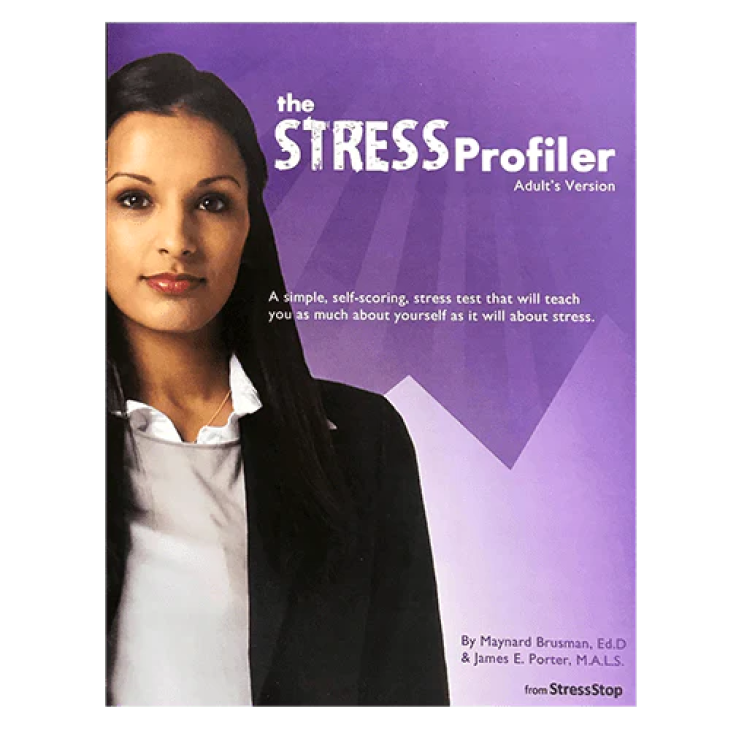
The 16-page Stress Profiler by Stresstopis a comprehensive stress assessment tool designed to evaluate stress levels in ten different areas of an individual's life. Alongside this assessment, the Stress Profiler provides corresponding articles offering advice on how to effectively cope with stress. This tool aims to address common questions related to stress, such as understanding the triggers behind anger, strategies to reduce worrying, managing life changes, and improving time management skills. It will only take you 15 to 20 minutes to complete the stress profiler. After you receive a total score, a graphical representation of the results is displayed, along with a personalized action plan.
The effectiveness of the Stress Profiler is underscored by its adoption by reputable organizations such as NASA, Blue Cross and Blue Shield, and Continental Health Promotion, which have purchased thousands of copies of this stress management test. This user-friendly tool can be employed by trainers during stress management seminars or provided as a self-guided resource for individuals to complete at their convenience, requiring no additional supervision.
Be Mindful Test Your Stress
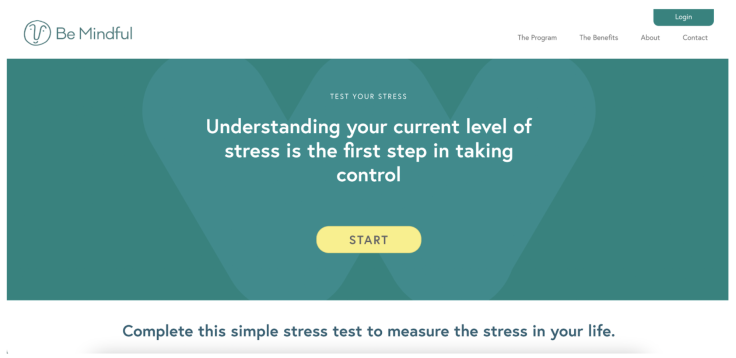
The Perceived Stress Scale (PSS) is a well-established stress assessment tool originally developed by Cohen et al. in 1983. It is widely recognized and clinically validated, frequently employed by healthcare providers, including the NHS and reputable medical services. The PSS is a component of the broader self-assessment utilized by participants in programs such as Be Mindful, which also encompasses evaluations for depression (PHQ9) and anxiety (GAD7).
The primary function of the Perceived Stress Scale (PSS) is to gauge an individual's perception of stress in their life. Through a series of questions, the PSS assesses the extent to which a person perceives their life as unpredictable, uncontrollable, and burdened, as well as directly inquiring about their current level of experienced stress.
The PSS questionnaire delves into thoughts and feelings experienced over the past month. Its questions are designed to be easily comprehensible and have a general nature, minimizing bias towards or against any particular subpopulation group. This characteristic enhances the test's objectivity and applicability to a wide range of individuals.
The Rosch Stress Profiler
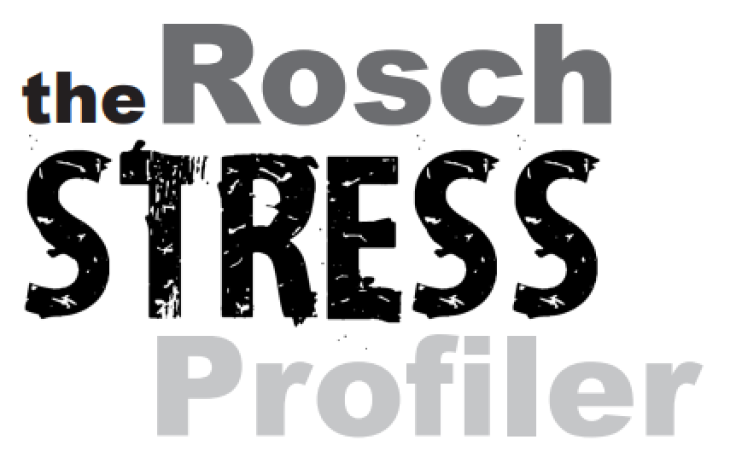
The Rosch Stress Profiler is a quick and efficient tool that assesses your coping abilities in various aspects of life, such as anger, worry, fear, financial stress, and time pressure, among others. It also evaluates your stress symptoms, stress outlets, social support, and overall resilience. In just 15 minutes, this profiler provides insights into your strengths and weaknesses regarding stress management. Armed with this knowledge, you can make informed decisions to address your areas of weakness and leverage your strengths, ultimately paving the way for a healthier and more balanced lifestyle.
Stress Management Society's Individual Stress Test
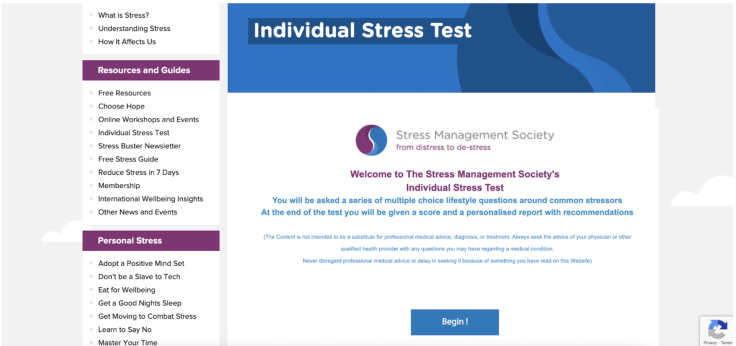
This assessment comprises a series of multiple-choice lifestyle questions designed to evaluate your exposure to common stressors. Upon completion of the test, you will receive a score along with a personalized report containing recommendations based on your responses. This tool aims to assist individuals in gaining insights into their stress levels and offers guidance on potential strategies for managing stress more effectively.
HeadsUpGuys Stress Test
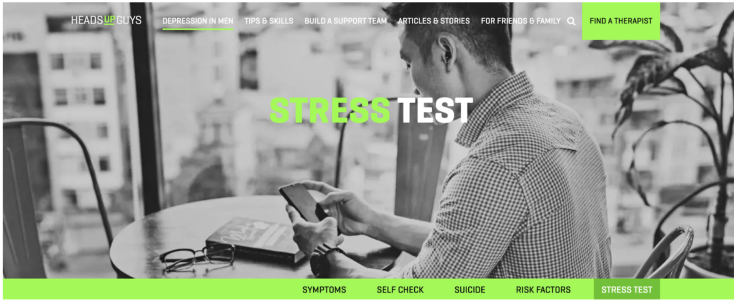
Upon completing this Stress Test, you will receive a list of your stressors, ranked by their level of manageability. For each stressor, HeadsUpGuys recommends assessing whether it falls within your sphere of control and whether there are actionable steps you can take to address it. They also suggest considering who you can engage in discussions about these stressors and seeking guidance or support where necessary. To make the most of this assessment, it's advisable to print or save the results, as they can provide a valuable starting point for a conversation with a healthcare provider or therapist. This conversation can help you access the right support and develop effective strategies for managing the stressors that impact your life.
Psychologist World's Stress Test

The Depression Anxiety Stress Scale 42 is a psychological assessment tool developed by Lovibond and Lovibond to gauge levels of stress, depression, and anxiety in individuals. By responding to a series of questions related to experiences over the past week, individuals can use this to assess their current state of well-being.
As a gentle reminder, it's important to understand that the results obtained from these tests are not intended for diagnostic purposes. Rather, they serve as a valuable tool to assist individuals in recognizing the need for professional guidance and support.
PsyCom's Stress Level Test
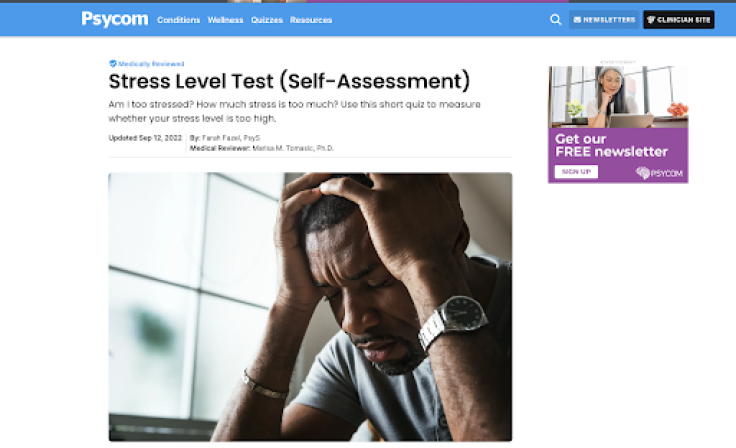
The Stress Level Test (Self-Assessment) is a brief questionnaire designed to help individuals assess their stress levels. It aims to provide insight into whether one might be experiencing excessive stress.
The questions within this quiz address common life experiences that are associated with elevated emotional or physical tension. It's also important to note that this quiz is not a diagnostic tool. Diagnosing mental health disorders requires the expertise of qualified mental health professionals. The Stress Level Test is a self-assessment tool meant to offer insights into stress levels and is not a substitute for professional medical advice or diagnosis.
Gentle Reminder
Stress can be a natural response to frustrating, overwhelming, or anxiety-inducing situations, and in moderation, it can be adaptive. However, when stress becomes chronic or long-term, it can have detrimental effects on physical and mental health.
However, it is imperative to remember that not all test results are entirely accurate, and self-assessment tools should be taken with a grain of caution. While it can help identify potential signs of stress overload, it is not a substitute for professional guidance. Mental health disorders are complex and require the expertise of qualified mental health professionals for accurate diagnosis and treatment. Mental health professionals can offer personalized assessments, interventions, and support to address your specific needs and ensure your mental and emotional well-being. Remember that reaching out for professional help is a sign of strength and a proactive step toward a healthier and more balanced life.





